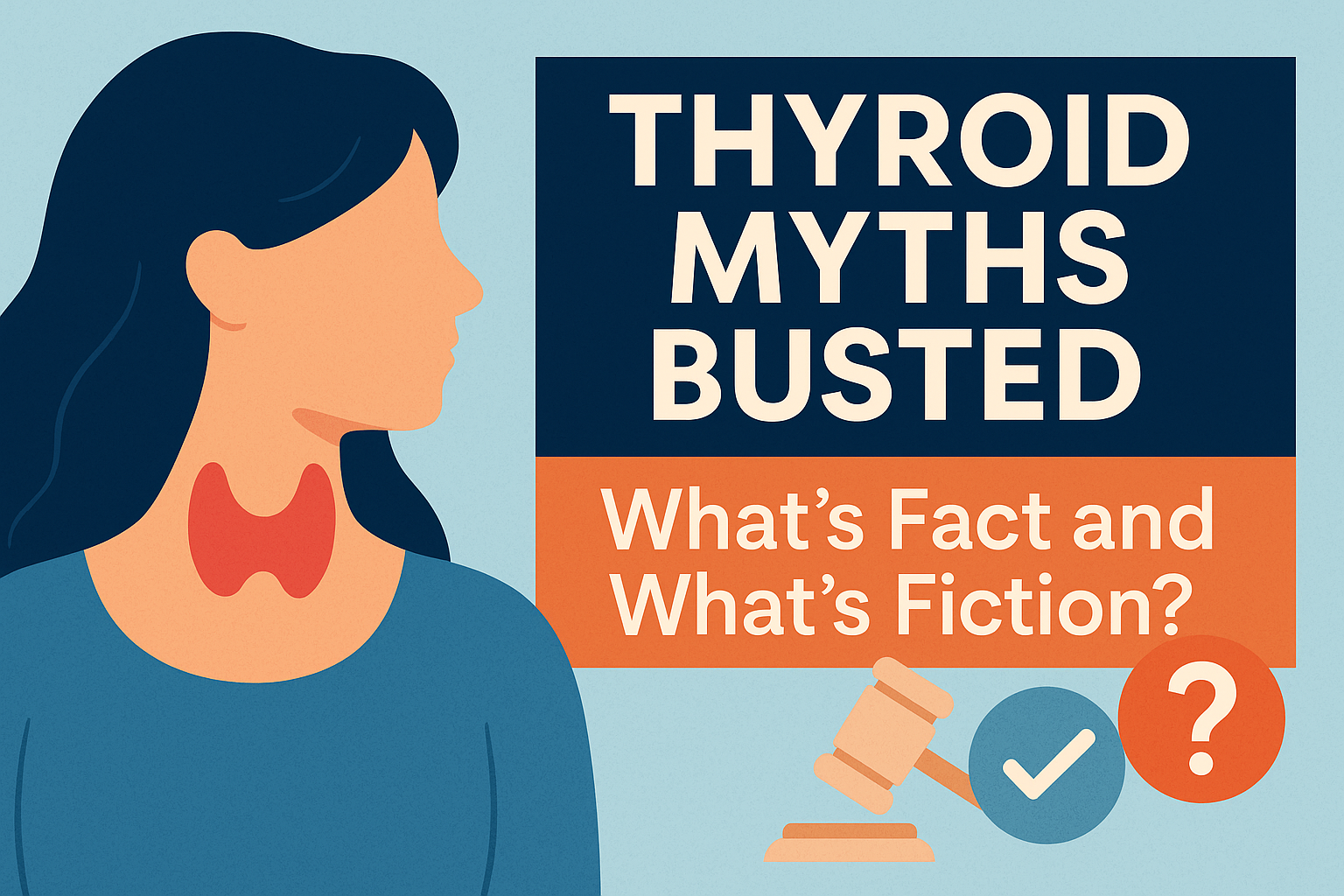
Thyroid Myths Busted: What’s Fact and What’s Fiction?
By Dr. Akshay Chugh in Internal Medicine
May 26, 2025
The thyroid gland may be small in size, but it plays a huge role in maintaining your overall health. Located at the front of the neck, this butterfly-shaped gland controls your body’s metabolism, energy levels, mood, weight, heart rate, and more through the release of thyroid hormones. However, despite growing awareness, there are still many myths and misconceptions surrounding thyroid disorders.
Myth 1: Thyroid problems only affect women
Fiction: Thyroid disorders are a “women-only” issue.
Fact: While it’s true that women are more prone to thyroid conditions, especially during pregnancy, menstruation, or menopause, men and children can also develop thyroid problems. It’s a condition that affects all genders & age groups.
Myth 2: If you have thyroid, you’ll need lifelong medication
Fiction: Once you start thyroid medication, you can never stop it.
Fact: Not necessarily. Some people require thyroid medication only temporarily, while others may need it long-term. The duration of treatment depends on the cause and severity of the thyroid issue. Regular monitoring and a doctor’s guidance are key.
Myth 3: Thyroid disease is the sole reason for weight gain
Fiction: If you’re gaining weight, it must be your thyroid.
Fact: Hypothyroidism can cause mild to moderate weight gain, but it’s not the only reason. Sedentary lifestyle, poor diet, stress, and other hormonal imbalances may also contribute. Thyroid may play a role, but it’s rarely the only factor.
Myth 4: Thyroid tests must be done on an empty stomach
Fiction: You must fast before getting a thyroid test.
Fact: Thyroid tests such as TSH, T3, and T4 do not require fasting. You can take them at any time of the day, although it’s generally recommended to test at the same time consistently for comparison.
Myth 5: Taking iodine supplements will cure thyroid problems
Fiction: Iodine supplements can fix all thyroid problems.
Fact: Iodine is important for thyroid function, but excess iodine can worsen certain thyroid conditions, especially autoimmune thyroid diseases. Always consult a doctor before taking any supplements.
Myth 6: People with thyroid should avoid exercise
Fiction: Exercise can make thyroid problems worse.
Fact: In reality, regular physical activity helps manage thyroid symptoms like weight gain, fatigue, and mood swings. Yoga, walking & strength training can be particularly beneficial.
Myth 7: Thyroid issues only cause fatigue and weight issues
Fiction: If I’m not tired or gaining weight, my thyroid is fine.
Fact: Thyroid disorders can present with a wide range of symptoms, including dry skin, hair loss, depression, memory issues, constipation, menstrual irregularities, and cold sensitivity. Not all symptoms are obvious.
Also Read: Understanding Thyroid Health: Symptoms, Causes, Types, and Treatments
Myth 8: Only allopathic treatment works for thyroid problems
Fiction: Natural remedies don’t help thyroid conditions.
Fact: While allopathic medicine is the standard and most effective treatment, especially for hormone replacement, certain lifestyle changes, diet improvements, and yoga practices can support better thyroid health. But never rely solely on alternative remedies—always consult your doctor.
Myth 9: Thyroid disorders are not serious
Fiction: Thyroid problems are minor and don’t require attention.
Fact: If left untreated, thyroid disorders can lead to serious issues like heart disease, infertility, depression & complications during pregnancy. Early diagnosis & regular monitoring are essential.
Myth 10: Once you’re on medication, testing is no longer needed
Fiction: Once medication starts, there’s no need for regular testing.
Fact: Thyroid hormone levels can fluctuate over time due to age, weight changes, stress, or other medications. Regular TSH monitoring helps ensure that your dosage remains accurate and effective.
Thyroid myths can lead to delayed diagnosis, unnecessary worry, or even harmful self-treatment. By separating fact from fiction, we can make better decisions for ourselves and our loved ones. If you’re experiencing symptoms like fatigue, mood changes, or weight fluctuation, don’t ignore them—get your thyroid tested and talk to a qualified doctor.







